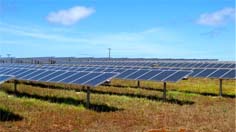Week in review: Intersolar kicks off as solar blooms around the world
 Last week was pretty busy for the world of solar. Japan started accepting applications for its long-anticipated feed-in tariff, meanwhile Brazil’s energy department announced that rooftop solar is reaching grid-parity in more markets there and Turkey kicked off an effort to add in more solar. At the same time the solar industry was preparing to show off its latest wares at Intersolar NA. On the other hand, GE announced it would stop work at its planned production facility in Colorado for 18 months and some are questioning whether rooftop PV leases are worthwhile.
Last week was pretty busy for the world of solar. Japan started accepting applications for its long-anticipated feed-in tariff, meanwhile Brazil’s energy department announced that rooftop solar is reaching grid-parity in more markets there and Turkey kicked off an effort to add in more solar. At the same time the solar industry was preparing to show off its latest wares at Intersolar NA. On the other hand, GE announced it would stop work at its planned production facility in Colorado for 18 months and some are questioning whether rooftop PV leases are worthwhile.
On July 1 Japan officially opened up its new, rich feed-in tariff (FiT) for renewable energy. The incentive was introduced as a way to help Japan meet its energy needs without nuclear power, following the Fukushima disaster in March 2011. The FiT could foster a $9.6 billion market for solar alone. Under the FiT PV systems receive 53 cents per kilowatt hour produced.
Long Island also launched it’s new FiT last week. The New York island’s Long Island Power Authority will start accepting applications for the program on July 16. Under the program the utility will incentivize up to 50 megawatts of new installations, paying 22 cents per kilowatt hour for the electricity produced by participating systems.
While such incentives have been needed where the price of electricity is low, in places where the costs of electricity are higher are already starting to reach grid parity. For instance, Brazil’s Empresa de Pesquisa Energetica (energy department) last week reported that cost of rooftop solar was equal to or lower than the cost of grid-supplied electricity in a growing number of service areas. According to the department solar cost less than grid-supplied electricity through 10 of Brazil’s 63 utilities.
Turkey is planning to become a bigger player in the solar market as well. The Mediterranean country announced that it plans to install 600 megawatts of solar starting in 2013, with large projects starting to come online in 2014 and 2015. The country is holding a conference in October to discuss the market potential there.
Today marks the kick-off of Intersolar North America one of the largest solar events in the U.S. It’s an ideal location for companies to introduce new products and services and opportunity for people to learn about emerging trends in the industry, policy, incentives and more. The event and its sister event, SEMICON West could draw up to 30,000 visitors this year.
In less positive news the solar leasing model, which has helped tens of thousands of U.S. citizens put solar on their homes with no up-front payment, is coming under fire.
Law firm Hagens Berman recently said it would launch an investigation into SunRun’s practices in anticipation of a potential class action lawsuit. Among other criticisms of the leasing or power-purchase agreements are that they might not deliver the electricity cost-savings they promise.
Citing increased competition, General Electric announced that it was halting construction on the US’s largest planned PV manufacturing plant, which was being built in Aurora, Col. The company was building out a cadmium telluride (CdTe) PV manufacturing plant capable of producing 400 megawatts of modules annually. The company said it would put construction of the project on hold for at least 18 months. The comes shortly after Colorado’s other CdTe manufacturer, Abound Solar, filed for bankruptcy. Like Abound GE said that pricing competition from China and a glut of PV modules made the technology less competitive than the company anticipated.



